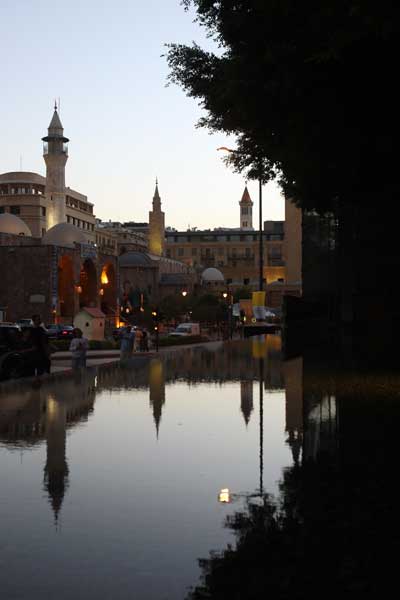Simon Calder: 'I want Ryanair and easyJet to fly to Beirut'
The man who pays his way

Friendly locals, beautiful scenery, proud history, delicious cuisine and rich culture: remind you of anywhere? It should. The vast majority of the nearly 200 nations promoting their tourism credentials at the World Travel Market in London this week used all these concepts to promote themselves, though Greenland, Cuba and Belarus may have struggled for credibility in the "cuisine" bit.
The recipe is simple. To those raw materials just mentioned, individual countries throw in extra spice as appropriate to entice visitors: dramatic shores, great skiing (don't try it, Holland) and – for the desperate – "island/city/ nation of contrasts". One year, both Colombia and neighbouring Ecuador used the latter slogan, adding a new dimension to their long-standing territorial tussle.
By the end of several days of meetings, you feel as though the world has taken a few thousand revolutions in a liquidiser. The result: a sunny-but-bland Utopia where every population is as welcoming as it is diverse, where rain falls just enough to create the promised paradise for nature lovers, and whose vibrant cities offer fascinating museums, chic cafés and luxurious hotels.
If the pronouncements of tourism ministers at the travel industry's biggest event can be taken at face value, it seems that everywhere you go, happy travels are guaranteed. Yes, minister, I'm sure readers of The Independent Traveller are already packing their bags for Guadalumpa, that hidden tropical gem.
Reality, sadly, is usually less idyllic and more complicated, which is why I was so pleased to meet Lebanon's tourism minister, Fadi Abboud. His Excellency's team had prepared the standard background: Lebanon is, apparently, a country "full of culture and authenticity" with a "vibrant capital" plus "wine regions, heritage areas and skiing". (Just in case you were wondering, using the internationally agreed standard, it is half the size of Wales.) But with commendable candour, the minister conceded that not everything is perfect, and told me what he intends to do about it.
I observed that I could fly from London to Larnaca in Cyprus and back for well under £200. But Middle East Airways and BMI – the only two airlines currently flying non-stop to Beirut – want at least twice as much for a flight only 15 minutes longer.
While other ministers might have shrugged off the issue with a few platitudes, Mr Abboud laid into his own national carrier.
"I agree. We need cheaper flights." He was scathing about the incumbent airlines, saying they charge "unacceptable" fares: "I really want Ryanair and easyJet to consider Lebanon. They'll have the full backing from my ministry. I will make sure they have the rights to fly to Lebanon."
This week Ryanair launched its first flight to Cyprus: from Charleroi in Belgium to Larnaca, at absurd fares (€43 return), out on 1 December, back 10 days later). And easyJet already flies from Luton to Tel Aviv. So His Excellency may not need to wait too long for the first no-frills flight to the shores of ancient Phoenicia, fringed by the azure Mediterranean, resonant with Biblical history yet dazzlingly 21st century (this hyperbole is infectious).
But what about the strident warning from the Foreign Office to prospective visitors of "A general threat from terrorism in Lebanon ... Attacks could be indiscriminate, including in places frequented by expatriates and foreign travellers"?
Mr Abboud's response: "Thank God the Brits do not do what they're told. If we take the last 20 years, I don't know of any tourist incident to write home about." And then he laid into someone else's territory: "I think we're much more secure than Mexico".
How to play Middle East geo-politics
A hurdle for any would-be visitor to Lebanon is the stipulation that presenting a passport with evidence of a visit to Israel will result in being denied entry. I asked the tourism minister, Fadi Abboud, about this awkward intrusion of geo-politics into travel. To my surprise he explained how to get around the rule:
"We do not like to stamp a passport with a stamp to Israel, but there are ways around it. You can visit Israel and ask the Israeli authorities not to stamp your passport." He recommends you ask officials to get the stamp on a separate piece of paper.
And while there are no direct links from Israel to Lebanon, Mr Abboud pragmatically explained that the two can be easily combined: "It's a 20-minute flight from Tel Aviv to Cyprus, and another 20 minutes to Beirut, so it is not impossible. We are grown-ups. We do not want to punish people who decide to visit Israel. It's not the end of the world."
Subscribe to Independent Premium to bookmark this article
Want to bookmark your favourite articles and stories to read or reference later? Start your Independent Premium subscription today.

Join our commenting forum
Join thought-provoking conversations, follow other Independent readers and see their replies